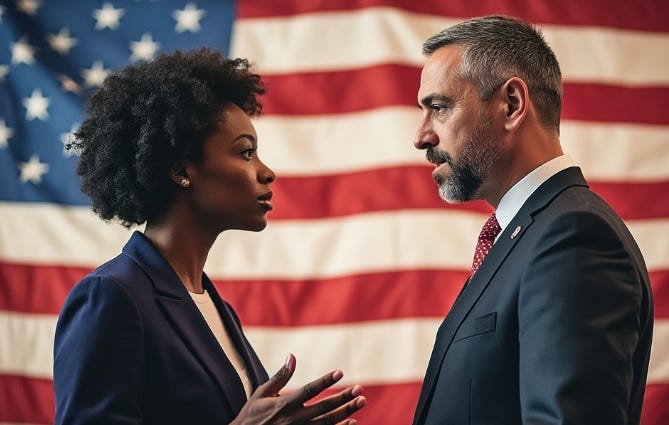How to Raise an (Optimistic) American, Part 7
"With malice towards none, with charity for all."
[This is the seventh of an 8-part series. Parts One, Two, Three, Four, Five and Six concern what makes the U.S. system special. We’ll be posting updates to the series throughout 2024.]
The seventh of America’s eight foundations is our mode of interacting with one another. America is based in the philosophies of equality, the presumption of goodwill, and “live and let live”. Despite the challenges of recent years, we honor spirited but respectful debate. If we can’t see eye to eye, we believe in parting amicably, agreeing to disagree.
Americans believe in equality. As the Declaration of Independence confidently asserted on July 4, 1776: “We hold these truths to be self-evident, that all men are created equal, that they are endowed by their Creator with certain unalienable Rights, that among these are Life, Liberty and the pursuit of Happiness.”
From the Biblical ideal of humanity’s creation in the image of God comes our understanding of “natural, God-given rights,” which are written into our founding documents. The natural extension of this fundamental Judeo-Christian tenet is what ultimately propelled the later Abolitionist movement in the Western world.
We’re also forgiving and believe in second chances, mercy, and redemption, in keeping with our Judeo-Christian roots. Our civic culture is grounded in Biblical precepts: Love thy neighbor, strive to deal honestly with others, and do not bear false witness against them. Our legal and economic systems rely on honest truth-telling and we have stern p+enalties for engaging in falsehoods—both cultural and legal. We teach our children to operate according to the so-called Golden Rule, which itself derives from the biblical admonition to “Do unto others as you would have them do unto you”. We also believe in the right to privacy and we do not spy on or monitor our neighbors.
Certainly, Americans value kindness and do not strive to hurt other people’s feelings; however, we place truth above these virtues when they conflict. When Americans see things differently, as they inevitably will in a pluralistic society, we agree to disagree, respecting the other person’s right to their own opinions. American generally operate plainly and honestly with the presumption of goodwill on the other party.
Our Biblical roots also teach us that people are flawed and imperfect. We should judge not, lest we be judged, and forgive those who trespass against us, if we want to be forgiven ourselves. Similarly, the bible teaches us in the very first chapter that there is no Utopia on earth—as we have been ejected from the Garden of Eden. This stands as a warning, as not surprisingly, most Utopian fantasies wind up creating dystopian realities. Hence, we aim to practice the art of making and accepting sincere apologies (knowing that one day you may be in need of forgiveness) rather than holding endless grudges or engaging in utter condemnation of those who have wronged us. We also have a history of having a sense of humor about people’s individual quirks and appreciating, rather than despising, these differences. For us, it’s part of what makes life interesting and fun.
Foundational reading:
First Amendment of the U.S. Constitution
The Gulag Archipelago & A Day in the Life of Ivan Denisovich by Aleksandr Solzhenitsyn
The History of the Stasi, by Jens Gieseke
1984, by George Orwell
Etiquette by Emily Post
The Best of Dear Abby, by Abigail Van Buren
The Merchant of Venice, by William Shakespeare
George Washington’s Rules of civility.
The Gettysburg address, Abraham Lincoln
Yale Report of 1828
The Chicago Statement
Mending Wall, by Robert Frost.
A Letter Concerning Toleration by John Locke
Lincoln’s Second Inaugural Address
John Kennedy’s Televised Address to the Nation on Civil Rights
We Shall Overcome, Lyndon B. Johnson,
Film: The Lives of Others (R)
[This is the seventh of an 8-part series. We’ll be posting new updates to the series throughout 2024.]


